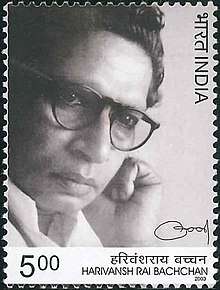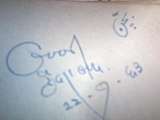Harivansh Rai Bachchan
Harivansh Rai Bachchan (27 November 1907 - 18 January 2003) was an Indian poet of the Nayi Kavita literary movement (romantic upsurge) of early 20th century Hindi literature. Born in the village of Babupatti, in the district of Pratapgarh, in the United Provinces of Agra and Oudh in British India, he was also a poet of the Hindi Kavi Sammelan. He is best known for his early work Madhushala (मधुशाला).[3] He is also the husband of social activist, Teji Bachchan, father of Amitabh Bachchan and grandfather of Abhishek Bachchan. In 1976, he received the Padma Bhushan for his service to Hindi literature.[4]
Harivansh Rai Bachchan | |
|---|---|
 | |
| Born | Harivansh Rai Srivastava 27 November 1907 Babupatti, United Provinces of Agra and Oudh, British India (present-day Uttar Pradesh, India) |
| Died | 18 January 2003 (aged 95) Mumbai, Maharashtra, India |
| Pen name | Bachchan |
| Occupation | Poet, writer |
| Language | Awadhi, Hindi |
| Alma mater | Allahabad University Cambridge University (PhD) |
| Notable awards | Padma Bhushan (1976) |
| Spouse | Shyama Bachchan
( m. 1926; died 1936) |
| Children | 2 (Amitabh Bachchan and Ajitabh Bachchan)[1] |
| Parents | Pratap Narayan Srivastava (father) Saraswati Devi Srivastava (mother) |
| Relatives | See Bachchan family |
| Signature |  |
| Member of Parliament Rajya Sabha[2] | |
| In office 3 April 1966 – 2 April 1972 | |
Early life
He was born in a Kayastha[5][6] family of Srivastava caste[7] in Allahabad, United Provinces of Agra and Oudh, British Raj in the year 1907. From 1941 to 1957, he taught in the English Department at the Allahabad University and after that, he spent the next two years at St Catharine's College, Cambridge, Cambridge University completing a PhD on W.B. Yeats.[3] He began using the pen name "Bachchan" (meaning child) instead of Srivastava when he wrote Hindi poetry. After returning to India, taught English literature at Allahabad University. He also worked at All India Radio, Allahabad.[3]
Writing career
Bachchan was fluent in several Hindi languages (Hindustani, Awadhi).[8] He incorporated a broadly Hindustani vocabulary,[9] written in Devanagari script.[8] While he could not read Persian script,[8] he was influenced by Persian and Urdu poetry, particularly Omar Khayyam.[10]
Works used in movies
Bachchan's work has been used in movies and music. For example, couplets of his work "Agneepath" are used throughout the 1990 movie Agneepath, starring Amitabh Bachchan, and later in the 2012 remake Agneepath, starring Hrithik Roshan.[11]
Mitti ka tan, masti ka man, kshan-bhar jivan– mera parichay.
(मिट्टी का तन, मस्ती का मन, क्षण भर जीवन, मेरा परिचय)
(A body of clay, a mind full of play, a life of a moment – that's me)[3]
List of works
|
|
|
References
- Harivansh Rai Bachchan, R (2001). In the Afternoon of Time: An Autobiography. Penguin books. p. 327. ISBN 9780140276633.
When we entered Amit for school, we adopted 'Bachchan' as our family name, registering him as 'Amitabh Bachchan'; and when our second son was born, he was called 'Ajitabh Bachchan'
- "Nominated Members Since 1952". 164.100.47.5. Retrieved 19 March 2020.
- Harivanshrai Bachchan, 1907–2003 Obituary, Frontline, (The Hindu), 1–14 February 2003.
- "Padma Awards" (PDF). Ministry of Home Affairs, Government of India. 2015. Archived from the original (PDF) on 15 November 2014. Retrieved 21 July 2015.
- "मधुशाला - हरिवंशराय बच्चन| Madhushaalaa - Harivansh Rai Bachchan. काव्यालय| Kaavyaalaya: See the 2nd last paragraph". kaavyaalaya.org. Retrieved 5 August 2020.
- "खुली किताब सा जीवन : हरिवंश राय बच्चन की जीवनी के चार खंड!". The Better India - Hindi. 25 November 2016. Retrieved 5 August 2020.
- https://navbharattimes.indiatimes.com/other/hum-hindustani/kaistha/kayastha-community/articleshow/46582169.cms
- West-Pavlov, Russell (2018). The Global South and Literature. Cambridge University Press. p. 167. ISBN 9781108246316.
- Williams, Mukesh; Wanchoo, Rohit (2008). Representing India: Literatures, Politics, and Identities. Oxford University Press. p. 73. ISBN 9780195692266.
Harivansh Rai Bachchan recalled how some of the Urdu vocabulary used by audiences in appreciating poetic recitals in Hindi kavi sammelans was consciously changed to Sanskritized Hindi creating an artificial Hindi idiom.
- Gopal, Madan (1996). Origin and development of Hindi/Urdu literature. Deep & Deep Publications. p. 204.
He was influenced by Persian and Urdu poetry, especially by Omar Khayyam and started versifying in the Bachchalian style.
- Harivansh Rai Bachchan (1907–2003). IMDb
- In the Afternoon of Time: An Autobiography: Harivansh Rai Bachchan, Rupert Snell, Baccana, Harivansh Rai BacHChhan: 9780670881581: Amazon.com: Books. 1 April 1998. ASIN 0670881589.CS1 maint: ASIN uses ISBN (link)
External links
| Wikimedia Commons has media related to Harivansh Rai Bachchan. |
- मधुशाला का मूल पाठ (विकीस्रोत पर)
- हरिवंश राय बच्चन (हिन्दी विकीपीडिया पर)
- मधुशाला (हिन्दी विकीपीडिया पर)
- हरिवंश राय बच्चन (विकीस्रोत पर)
- A Collection
Further reading
- Kaveendra, Anil Pushker. Harivanshrai Bachchan Ki Anuvad Drishti (Hindi) (Hardcover) (2013). Ruby Press & Co., New Delhi. ISBN 978-93-82395-20-1